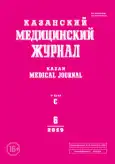Этико-правовые проблемы клонирования человека
- Авторы: Гурылёва М.Э.1, Хамитова Г.М.1
-
Учреждения:
- Казанский государственный медицинский университет
- Выпуск: Том 100, № 6 (2019)
- Страницы: 992-1000
- Тип: Этические проблемы медицины
- URL: https://journal-vniispk.ru/kazanmedj/article/view/18525
- DOI: https://doi.org/10.17816/KMJ2019-992
- ID: 18525
Цитировать
Полный текст
Аннотация
В развивающихся науке и обществе всё чаще встают вопросы о приемлемости использования тех или иных изобретённых технологий. Эти вопросы требуют однозначного решения и контроля его соблюдения. Один из наиболее острых современных вопросов биомедицины — возможность клонирования человека, правовое регулирование которого не разработано. Цель работы — анализ существующей этико-правовой базы клонирования человека в Российской Федерации и разработка предложений по её совершенствованию. Авторы изучили материалы, опубликованные с момента изобретения технологии клонирования, такие как выступления ведущих учёных, научные публикации по данной теме, работы исследовательских групп (как в поддержку клонирования, так и против неё), а также результаты социологических опросов населения, нормативно-правовые акты Российской Федерации, опыт иностранных государств в вопросах регламентации биотехнологий. Выявлен недостаток правового регулирования процесса клонирования человека на территории Российской Федерации. Выдвинуты предложения по его дополнению: (1) уточнение в законодательных документах терминологии и юридическое закрепление понятий терапевтического и репродуктивного клонирования; (2) установление наказаний за нарушение запретов применения технологии и определение механизмов правоприменения этих наказаний; (3) развитие направления «соматические права человека» и, с взглядом на перспективу, закрепление прав человеческого клона. Авторы уверены, что при наличии правового урегулирования развитие технологии не принесёт морального вреда человечеству.
Ключевые слова
Полный текст
Открыть статью на сайте журналаОб авторах
Марина Элисовна Гурылёва
Казанский государственный медицинский университет
Email: gulnarakgmu@mail.ru
SPIN-код: 6207-9971
Россия, г. Казань, Россия
Гульнара Муллануровна Хамитова
Казанский государственный медицинский университет
Автор, ответственный за переписку.
Email: gulnarakgmu@mail.ru
SPIN-код: 5746-5562
Россия, г. Казань, Россия
Список литературы
- Яценко В.В., Люборец Е.С. Вопросы правового регулирования клонирования человека. В кн.: Эволюция государства и права: история и современность. Ч. 1. 2017; 167–171.
- Веселова О.В., Трошина Е.В. Клонирование человека как морально-этическая правовая категория. Соврем. пробл. права, экономики и управления. 2016; (1): 13–18.
- Силуянова И.В. Искушение клонированием, или человек как подобие человека. Сергиев Посад: Московское подворье Свято-троицкой Сергиевой лавры. 1998; 16.
- Копьяк А.С. Проблема клонирования человека: морально-этические и юридические аспекты. Соврем. науч. исследования и инновации. 2012; (2): 14.
- Доклад Местоблюстителя Патриаршего Престола митрополита Смоленского и Калининградского Кирилла на Поместном Соборе Русской православной церкви (Москва, 27–29 января 2009 г.). http://www.patriarchia.ru/db/text/141422.html (дата обращения: 23.05.2019).
- Коваленко А.И., Матющенко В.С. Этико-правовые вопросы клонирования человека в России. Амурский мед. ж. 2019; (1): 88–91. doi: 10.22448/AMJ.2019.1.88-91.
- Savvina O.V. Ethical problems of cloning humans (SCNT). Вестн. Рос. ун-та дружбы народов. Серия Философия. 2015 (2): 115–119.
- Доссе Ж. Научное знание и человеческое достоинство. Курьер ЮНЕСКО. 1994; (11): 5.
- Катанян К. Обратная сторона клонирования. НГ-наука. 1997; (4): 3.
- Нежметдинова Ф.Т. Гуманитарная экспертиза рисков внедрения современных технико-технологических достижений НБИК-технологий на основе биоэтики: методологический подход. Инноватика и экспертиза: научные труды. 2013; (1): 132–138.
- Тищенко П.Д. Биоэтическое обеспечение научного развития в обществе риска. Рабочие тетради по биоэтике. Вып. 11. Гуманитарное обеспечение инновационного развития биомедицинских технологий. Сб. науч. ст. Отв. ред. П.Д. Тищенко. М.: Изд-во Моск. гуманит. ун-та. 2010; 36.
- Смирнов А.М. К вопросу о допустимости клонирования человека в контексте реализации соматических прав человека. Образование и наука в России и за рубежом. 2019; (2): 67–71.
- Тищенко П.Д. Мир будущего. Журнальный клуб «Интелрос Фома». 2015; (7). www.intelros.ru/readroom/foma/f147-2015/27350-mir-buduschego-pavel-tischenko.html (дата обращения: 23.05.2019).
- Фукуяма Ф. Наше постчеловеческое будущее. М.: АСТ. 2008; 349 с.
- Зайцева И.А. Секретные результаты опытов клонирования. Сколько среди нас? М.: РИПОЛ классик. 2007; 256 с.
- Юдин Б.Г., Игнатьев В.Н., Полубинская С.В. и др. Этико-правовые проблемы биомедицинских исследований и практического здравоохранения в современной России [отчёт о НИР №96-06-80602 (Российский фонд фундаментальных исследований)]. Информационный бюллетень РФФИ №4. https://elibrary.ru/download/elibrary_230265_59600198.htm (дата обращения: 23.05.2019).
- Федеральный закон от 20 мая 2002 г. №54-ФЗ «О временном запрете на клонирование человека». Информационно-правовое обеспечение «Гарант». http://base.garant.ru/57430472/ (дата обращения: 31.05.2019).
- Федеральный закон от 29 марта 2010 г. №30-ФЗ «О внесении изменения в статью 1 Федерального закона “О временном запрете на клонирование человека”». Информационно-правовое обеспечение «Гарант». http://base.garant.ru/57430472/ (дата обращения: 31.05.2019).
- Йорыш А.И. Правовые и этические проблемы клонирования человека. В сб.: Современное медицинское право в России и за рубежом. Сб. науч. тр. Центр социал. науч.-информ. исслед.; отд. правоведения; ИГП. Центр эколого-правовых исслед.; центр адм.-правовых исслед. Отв. ред.: О.Л. Дубовик, Ю.С. Пивоваров. М. 2003; 235–254.
- Доктор Сид клонирует себя. Газета «Комерсантъ». 1998. №169. 12 сентября.
- Коркунов Н.М. Лекции по общей теории права. М.: Юрайт. 2016; 422 с.
- Сальников В.П., Бабаджанов И.Х. Клонирование человека: теория правового регулирования. Мир политики и социологии. 2016; (9): 173–182.
- Всеобщая декларация о геноме человека и правах человека от 11 ноября 1997. Генеральная Конференция ООН по вопросам образования, науки и культуры. Информационно-правовое обеспечение «Гарант». http://base.garant.ru/57430472/ (дата обращения: 31.05.2019).
- Декларация ООН о клонировании человека от 8 марта 2005. Резолюция 59/280 Генеральной Ассамблеи. Информационно-правовое обеспечение «Гарант». http://base.garant.ru/57430472/ (дата обращения: 31.05.2019).
- Дополнительный протокол к Конвенции о защите прав человека и достоинства человеческого существа в связи с применением биологии и медицины, касающийся запрещения клонирования человеческих существ, от 12 января 1998. Конвенция о защите прав человека и достоинства человеческого существа в связи с применением биологии и медицины, касающаяся запрещения клонирования человеческих существ. Информационно-правовое обеспечение «Гарант». http://base.garant.ru/57430472/ (дата обращения: 01.06.2019).
- Боржонов М.И. Клонирование человека: этико-правовые проблемы. Вестн. Ин-та законодательства и правовой информации им. М.М. Сперанского. 2013; (5): 57–62.
- Романовский Г.Б., Романовская О.В. Проблемы правового регулирования применения биомедицинских технологий в России и за рубежом. Гены & клетки. 2016; (1): 75–81.
- Рыжова А.А. Клон человека как субъект конституционного права. Наука. Общество. Государство. 2017; 5 (1): 69–75.
- Назаренко В.О. Проблемы правового регулирования вопросов клонирования человека в Российской Федерации. В кн.: Современные проблемы правотворчества и правоприменения. Байкальский студенческий юридический форум-2019: материалы Всероссийской студенческой научно-практической конференции. 2019; 80–83.
Дополнительные файлы






